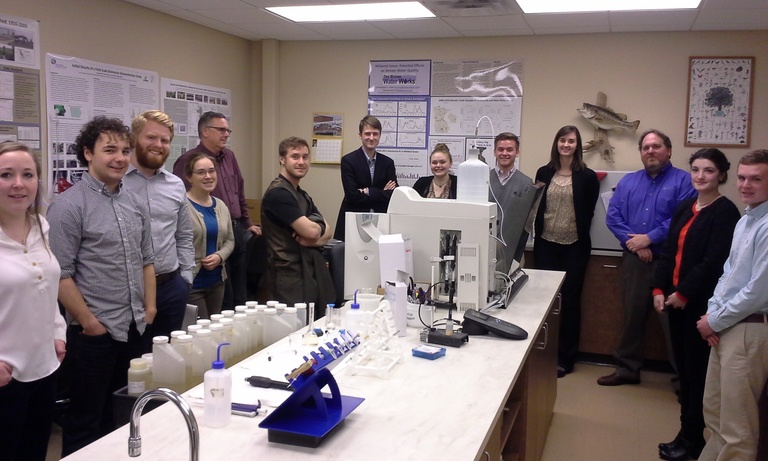University of Iowa junior Will Collier sat at the back of the Iowa House chambers, casually chatting with Rep. Lee Hein, enjoying a one-on-one conversation in between Hein’s votes on some of Iowa’s big environmental issues.

This interaction was one of the ways the new Iowa Environmental Policy in Practice course brought students and legislative leaders together to champion Iowa’s environment. The course, which focused on how environmental policy is made in Iowa, was offered this spring semester through the Department of Geographical and Sustainability Sciences in the College of Liberal Arts and Sciences. David Osterberg, a professor in the College of Public Health, Department of Occupational and Environmental Health, had the 12 students read policy statements and information on everything from wind power to nitrate reduction.
“How it’s made, who makes it, who are the players, that’s what we focus on,” Osterberg says of the focus on policy.
Osterberg was a part of the original group who brainstormed the idea for the class, never expecting to be the one to teach it.
“I did not design this class,” Osterberg says. He explains that he originally thought he would just come in and give a lecture or two; however he was later chosen to teach the entire curriculum. Now, his students can’t see anyone else teaching it.
Their weeks of research on Iowa’s environmental issues such as water resources and energy efficiency led up to the big event, where the students spent their spring break in Des Moines, meeting with legislation from both the House and Senate, policy makers, and environmental groups. Each student was paired with a member of the legislature, often those representing their hometown districts, who they were allowed to shadow throughout the week. The students also sat in on some meetings and attended several gatherings of environmental groups and state officials working on environmental issues.
Collier, an environmental policy and planning major from Newton, Massachusetts, says that the trip to Des Moines was one of the most vital parts of the class and that he enjoyed the interesting experience meeting with Iowa Rep. Hein, chair of the House Environmental Protection Committee.
“The trip to Des Moines was very beneficial. I found that our meetings were very important because we got the opportunity to see and hear from multiple approaches and views on differing issues,” Collier says.
Osterberg is a former member of the Iowa legislature and a former member of the Iowa Environmental Council, the organization that provided a lot of the reading and research material for the new course. Osterberg’s Des Moines connections, thanks to his continued work in Iowa’s capitol, helped create a cohesive and inclusive experience for his students, with a little help from the dean of the College of Public Health Sue Curry, as well as George Malanson, a professor within the Department of Geographical and Sustainability Sciences.
“Having the opportunity to be taught by a pioneer in the environmental movement in Iowa was amazing,” says UI graduating senior Steven Williams, from Johnston, Iowa, who graduated this month with degrees in political science and environmental policy. He initially decided to take the course for a requirement but as he found out more about it, he said that it was a ‘real-life’ experience that he didn’t want to pass up.
Because of its direct ties to politics, the class has brought in several political science and economics students like Williams, who study alongside others who are working on the Sustainability Certificate.
“I have gained a better understanding of how difficult it is to accomplish environmental goals with so many actors involved at the state level,” Williams says. “Additionally, I have realized actually how big of an environmental impact our state has and how limited many governmental leaders remain in addressing these issues due to political agendas.”
At the end of this exciting semester, the students focused on their final projects. Each group of students focused their research on a topic covered in class, including wind and solar energy, energy conservation and efficiency, water resources and nitrate reduction, and frac sand mining. The projects took these areas of research and look at how Iowa’s policy currently views them and ways to improve upon issues with that policy. The students had the option to spend their last few weeks outside of the classroom working on their projects but decided to continue meeting, working together to foster more ideas.
“The project my partner and I are worked on focused on renewable energy and energy efficiency at the household level here in Iowa,” Collier says. “We chose this topic because energy has been something we’ve both been interested in and something that we would love to learn more about and to advocate on behalf of.”
Osterberg says he has never had a class so enthusiastic about a course. Overall, it seems that passion for environmental policy is the name of the game for this course.